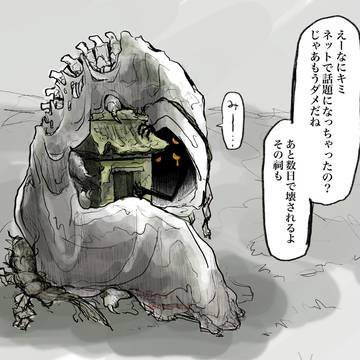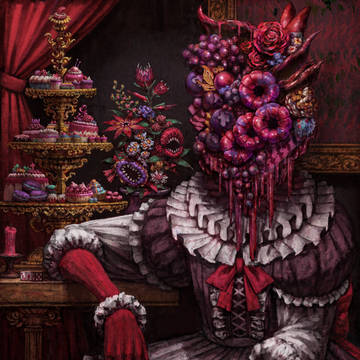P F M A Thyroid cancer
Top Left: Papillary Carcinoma
Most common, good prognosis
The monster is the most “humanoid,” with a skull-like face and organized form, representing its high prevalence and relatively favorable outcome.
“Orphan Annie” nuclei (empty nuclei)
The wide, hollow glowing eyes mimic empty, cleared-out nuclei — a direct visual reference.
Psammoma bodies
Shield contains circular formations resembling calcified psammoma structures.
RET/PTC and BRAF mutations, childhood irradiation
Radiating red tendrils behind the head suggest genetic and radiation-linked activation.
Palpable lymph nodes
Visible lump on the neck (near clavicle) suggests nodal spread.
Bottom Left: Follicular Carcinoma
Invades capsule and vasculature
Armor looks fractured and cracked, suggesting penetration beyond boundaries.
Uniform follicles
Chest is patterned with tightly packed nodular structures, resembling repetitive follicular histology.
Hematogenous spread (unlike papillary)
Subtle vein-like red streaks run down the arms — hinting at vascular dissemination.
RAS & PAX8-PPAR-γ translocations
Represented by mirror-like dual red chest patterns, symbolizing translocations/fusion.
FNA can't reliably distinguish adenoma from carcinoma
Ambiguous facial expression, blurred between benign and malignant — echoing diagnostic challenge.
Top Right: Medullary Carcinoma
From parafollicular “C cells” → calcitonin
The figure’s central red chest mass is soft and jelly-like — evoking secretory material (calcitonin and amyloid).
Polygonal cells in amyloid stroma
Chest is shaped with interlaced polygonal armor plates — geometric, calcified structures.
Congo red staining amyloid
Shield resembles a waxy, amyloid mass with Congo red–like texture.
Associated with MEN2A, MEN2B (RET mutation)
Twin-headed beast behind the main one (barely visible) implies syndromic linkage — shared origin in RET mutation syndromes.
Bottom Right: Anaplastic Carcinoma
Older patients, rapidly enlarging, compressive mass
Most grotesque and hulking form — oversized and menacing, suggesting uncontrollable growth.
TP53 mutation
Weapon is a giant butcher’s cleaver — a blunt symbol of genetic chaos and destruction.
Very poor prognosis
Face is twisted and decaying, beyond repair — no elegance, no control, just rapid destruction.
Compresses trachea/esophagus (dysphagia, hoarseness)
The neck and upper chest bulge with pressure — visualized as crushing tissue underneath.
Most common, good prognosis
The monster is the most “humanoid,” with a skull-like face and organized form, representing its high prevalence and relatively favorable outcome.
“Orphan Annie” nuclei (empty nuclei)
The wide, hollow glowing eyes mimic empty, cleared-out nuclei — a direct visual reference.
Psammoma bodies
Shield contains circular formations resembling calcified psammoma structures.
RET/PTC and BRAF mutations, childhood irradiation
Radiating red tendrils behind the head suggest genetic and radiation-linked activation.
Palpable lymph nodes
Visible lump on the neck (near clavicle) suggests nodal spread.
Bottom Left: Follicular Carcinoma
Invades capsule and vasculature
Armor looks fractured and cracked, suggesting penetration beyond boundaries.
Uniform follicles
Chest is patterned with tightly packed nodular structures, resembling repetitive follicular histology.
Hematogenous spread (unlike papillary)
Subtle vein-like red streaks run down the arms — hinting at vascular dissemination.
RAS & PAX8-PPAR-γ translocations
Represented by mirror-like dual red chest patterns, symbolizing translocations/fusion.
FNA can't reliably distinguish adenoma from carcinoma
Ambiguous facial expression, blurred between benign and malignant — echoing diagnostic challenge.
Top Right: Medullary Carcinoma
From parafollicular “C cells” → calcitonin
The figure’s central red chest mass is soft and jelly-like — evoking secretory material (calcitonin and amyloid).
Polygonal cells in amyloid stroma
Chest is shaped with interlaced polygonal armor plates — geometric, calcified structures.
Congo red staining amyloid
Shield resembles a waxy, amyloid mass with Congo red–like texture.
Associated with MEN2A, MEN2B (RET mutation)
Twin-headed beast behind the main one (barely visible) implies syndromic linkage — shared origin in RET mutation syndromes.
Bottom Right: Anaplastic Carcinoma
Older patients, rapidly enlarging, compressive mass
Most grotesque and hulking form — oversized and menacing, suggesting uncontrollable growth.
TP53 mutation
Weapon is a giant butcher’s cleaver — a blunt symbol of genetic chaos and destruction.
Very poor prognosis
Face is twisted and decaying, beyond repair — no elegance, no control, just rapid destruction.
Compresses trachea/esophagus (dysphagia, hoarseness)
The neck and upper chest bulge with pressure — visualized as crushing tissue underneath.
0
1
30
2025-04-09 03:07





















































































































Comments (0)
No comments